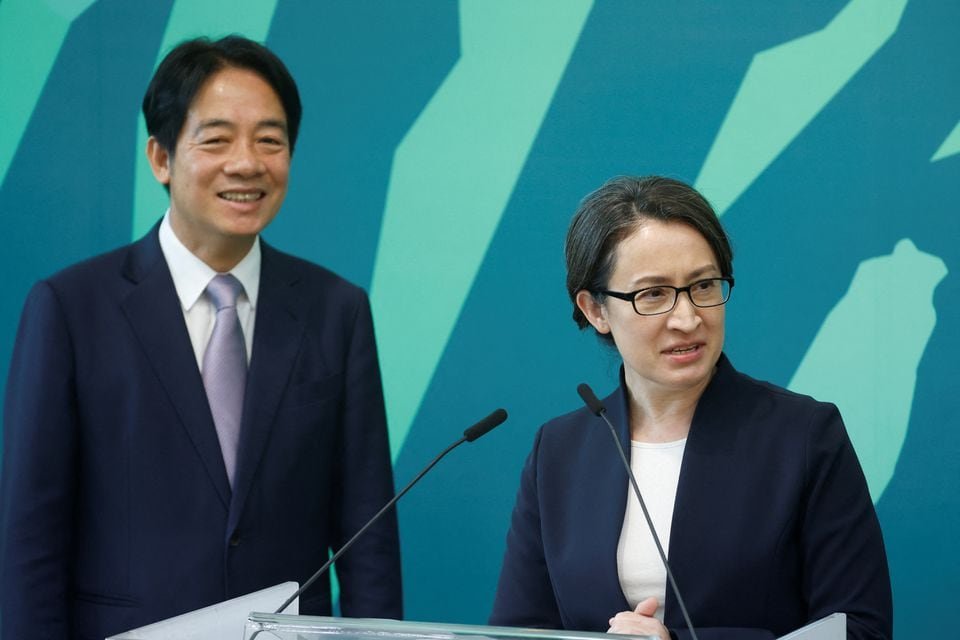Taiwan’s former US envoy, well-known in the U.S. and vilified by China, was named the VP candidate. On Monday, the frontrunner for Taiwan’s presidency, Lai Ching-te, said that Taipei’s former envoy to the United States will be his running partner in the election scheduled for January. This high-profile diplomat is well-known in Washington, but Beijing views him as a separatist.
Before the election, which is taking place as Taiwan is coming under growing pressure from China to accept its sovereignty claim, the Democratic Progressive Party’s (DPP) presidential candidate, Vice President Lai, has led in most opinion polls. Lai is the candidate for the DPP, the ruling party in Taiwan.
His running mate, Hsiao Bi-khim, is 52 years old and has excellent connections in Washington. Since 2020, he has served as Taiwan’s de facto ambassador to the United States. It was widely assumed that he would be Lai’s running mate.
Lai announced his intention to publicly introduce Hsiao as his running mate on Monday afternoon in a message he shared on his Facebook page. The Ministry of Foreign Affairs of Taiwan said that it has accepted her resignation.
“I believe that Bi-khim is definitely an excellent person when it comes to Taiwan’s diplomatic work today, and she is a rare diplomatic talent in our country,” said Lai further.
Hsiao has been a friend of Rupert Hammond-Chambers, president of the United States-Taiwan Business Council, since the 1990s. Hammond-Chambers described Hsiao as a “formidable politician” who would give Lai’s ticket the diplomatic and security heft it desperately needs.
“Bi-khim’s relationships in D.C. will be invaluable to President Lai; if he is elected, she’s going to bring all of those relationships into his government, and he doesn’t have those,” he explained to Reuters.
Although the United States is Taiwan’s most important overseas sponsor and supplier of armaments, it does not have any formal links with the island, as is the case with most other countries.
‘ACT OF INDEPENDENCE’
China has twice imposed sanctions on Hsiao, the most recent of which was in April, and views her with disdain, similar to how it views Lai. The Chinese government cites Hsiao’s status as an “independence diehard” for the restrictions.
On Wednesday, China’s Taiwan Affairs Office referred to Lai and Hsiao as an “independence double act.” They also stated that the people of Taiwan were “very clear” about what their alliance meant for the “situation in the Taiwan Strait.” It did not go into further detail.
After Lai returned from a short visit to the United States in August, China carried out military maneuvers surrounding Taiwan in what the Chinese military described as a “serious warning against Taiwan independence separatist forces colluding with external forces to provoke.”
The DPP advocates for maintaining Taiwan’s identity apart from China. The administration that the DPP controls maintains that only the people of Taiwan can decide the island’s fate. Despite numerous offers to negotiate with Beijing, it has always been rejected.
In contrast to the attempts of Taiwan’s two main opposition parties to agree on a unified ticket, the Democratic Progressive Party (DPP) has handled their vice presidential contender in a calm and collected manner. Their discussions had come to a standstill.
After initially agreeing to cooperate, the major opposition party, the Kuomintang (KMT), which typically supports tight connections with Beijing, is currently involved in a debate with the more minor Taiwan People’s Party about which of their candidates should run for president and which should run for vice president. The KMT traditionally favors close ties with Beijing.
Friday marks the end of the period when presidential candidates can register with the election commission. In a post he made on Facebook, Lai alluded to the “turmoil” occurring within the opposition camp. “In contrast, the team I lead is a fully prepared and tested one,” according to him.
Hsiao was born in Japan to a Taiwanese father and an American mother. He began his career working in the office of the then-president Chen Shui-bian, who was also a member of the DPP and then went on to become a congressman for the DPP.
To highlight the fact that she is a native Taiwanese speaker as opposed to a Chinese one, she spells her name in English using a Taiwanese Hokkien variant. This is highly unusual in Taiwan.
































Comment Template